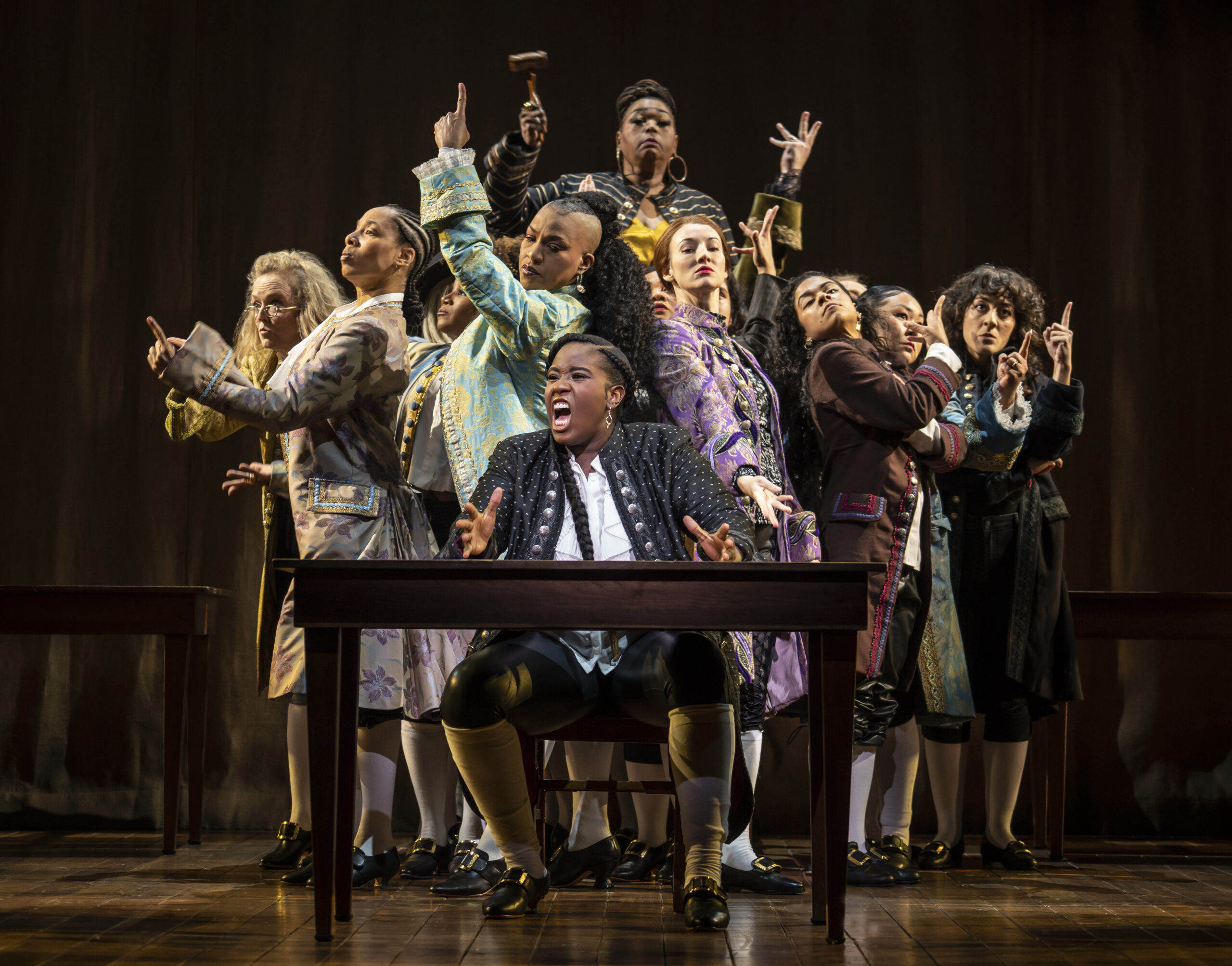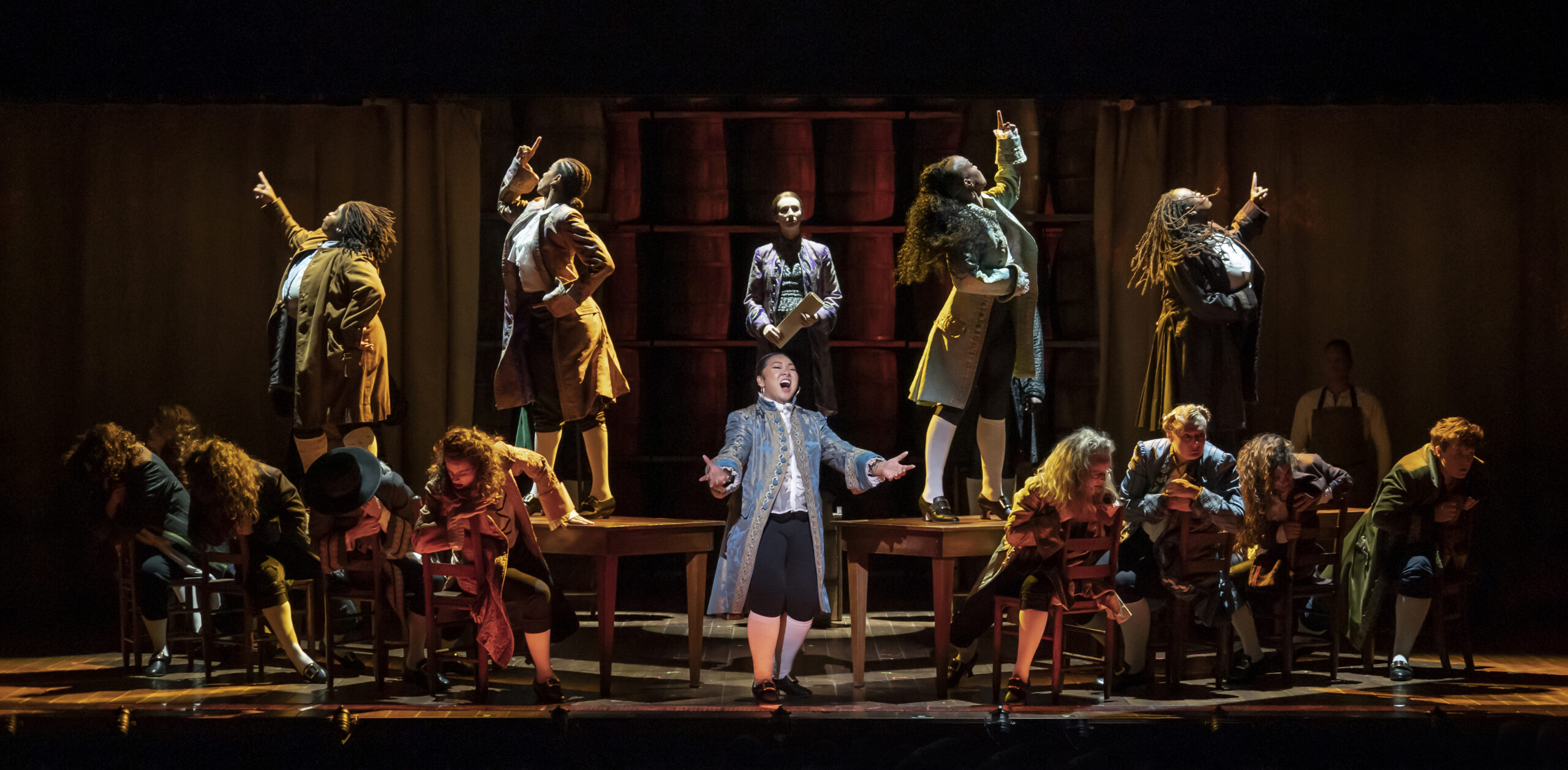
The much anticipated revival of the celebrated musical 1776 has finally arrived. The 1969 Sherman Edwards/Peter Stone musical story about the signing of the Declaration of Independence by our cis-male founding fathers has come to the American Airlines theatre without a cis-gendered man in sight. And why not? Shakespeare plays had all-male casts.
Winning the 1969 Tony Award for Best Musical, 1776 has seen a film version (1972), a previous revival (1997), and a stop-by at Encores (2016). This latest staging is unique, gutsy, and visionary; it completely succeeds in conveying one of the best books of a musical ever written, yet with a racially diverse, all-female, transgendered, and non-binary cast, shining a different kind of light on a play in which white men and their testosterone jockey for their controlling interests in government.
As the audience takes its seats, it observes an Americana patchwork curtain of flags, and a line of low-heeled, leather shoes with buckles at the foot of the stage. The curtain goes up, and the cast walks on, presenting itself in uniquely modern dress. The actors regard the audience for a moment; they bend forward, remove their contemporary footwear, roll their white socks up to the knees, and don fancy coats. They then walk to the foot of the stage, step into those shoes, and proceed to kick the congressional doors off their hinges.
This cast is terrific; it introduces itself in the rousing opening numbers “Sit Down, John” and “Piddle, Twiddle, and Resolve”, their fire and energy sparkling through co-director Jeffrey L. Page’s clever and stately choreography.
Leading the cast is Crystal Lucas-Perry, whose obnoxious and disliked John Adams (Massachusetts) is passionate and powerful. Keeping her voice big and bold like the character she plays, she saves her vibrato for more intimate, emotionally vulnerable moments like those in her final number “Is Anybody There” and with John Adam’s wife Abigail. John Adams is the anchor of this play, and Lucas-Perry’s energy is more than sufficient ballast for the piece.

Allyson Kaye Daniel as Abigail Adams is warm and solid; her every entrance onto the stage is like a warm hug, and her songs with Lucas-Perry, “Till Then” and “Yours, Yours, Yours” are as lovely as they are loving. (Daniel also doubles up as Rev. Jonathan Witherspoon (New Jersey)).
Three-time Tony Award nominee Carolee Carmello as Adam’s nemesis John Dickinson (Pennsylvania) is regal, scathing, and riveting. She commands her space with shrewd confidence. As she leads the conservative congressmen in “Cool, Cool Considerate Men”, her clear, shrill voice sends shivers through the spines of the warm-blooded, and she has the pleasure of delivering one of the best lines in the entire play, a line which perfectly describes the conservative populace, then and now:
DICKINSON
Don’t forget that most men with nothing would rather protect the possibility of becoming rich than face the reality of being poor. And that is why they will follow us…to the right, ever to the right!
Thomas Jefferson (Virginia) is played by Tony Award nominee Elizabeth A. Adams with a quiet, evocative reserve. One of many poignant unspoken moments in the play is when Adams’ face changes on hearing Jefferson’s words “all men are created equal” while being attended to by a slave. Adams’s expressions continue to speak more loudly than words every time a cut is made to the declaration, finally erupting in exasperation when John Adams says:
ADAMS
Good God, Jefferson! Don’t you ever intend to speak up for your own work?!
JEFFERSON
I had hoped that the work would speak for itself.
Jefferson’s wife Martha sings one of my favorite songs in this show, “He Plays the Violin”; I still love listening to Betty Buckley’s version on the original Broadway recording, from back when Buckley’s voice was light, fresh, and new. As Eryn LeCroy begins to sing this song, everyone knows she has a lot to live up to, and by George, she delivers. Her rendition is playful and sweet, and also powerful and vibrant. Her amazing vocals quiver like the very violin strings she sings about; LeCroy has redefined this ballad beautifully. As the only other double-cast actor in the show, LeCroy’s Dr. Lyman Hall (Georgia) is fiercely earnest; the moment she breaks from her southern roots and shakes Adam’s hand in allegiance with independence is memorable.
Patrena Murray is spot-on as Ben Franklin (Pennsylvania), portraying one of America’s most famous founding fathers with jocularity and warmth. Shawna Hamic’s Richard Henry Lee is boisterous fun, bringing freshness to the “The Lees of Old Virginia”. Joanna Glushak portrays the lush Stephen Hopkins (Rhode Island) both with delicate humor and heart-weariness. Mehry Eslaminia makes the most of her turn as Charles Thomson (Congressional Secretary), finding appropriate levity or gravity in her sole responsibility of reading George Washington’s letters and other documents. Gisela Adisa doesn’t get much to do in the part of Robert Livingston (New York), as Livingston is constantly abstaining, and “courteously”, but Adisa garners one of the best laughs of the evening upon retorting to Handcock’s “Mr. Livingston! What in hell goes on in New York?!”; her response is appreciated by every New Yorker in the audience:
LIVINGSTON
Have you ever been present at a meeting of the New York legislature? They speak very fast and very loud and nobody pays attention to anyone else with the result that nothing gets done.
My other favorite song in this show is the melodic and somber “Momma, Look Sharp”. Its sentiment has always struck a chord, and I looked forward to hearing it again. I was enraptured from the moment the entire cast began its back up chords; Salome B. Smith (as the Courier) and the cast are exquisite in this moving, stunning rendition. I cannot wait to hear it again. I could do without the grieving “mother figure”, which distracted from Smith.

Just when I thought there was no more room in this production for extraordinary moments, the Congress reached its impasse over the inclusion of slave liberation language in the declaration, and the cast erupts into a angry and violent “Molasses to Rum”, an astonishing peak to the evening’s performance, lead by the staggeringly phenomenal Sara Porkalob as Edward Rutledge (South Carolina).
Liz Mikel and Tiffany Barbour turn in small but significant performances as John Hancock (President of the Congress) and (Andrew McNair, Congressional Custodian), respectively. Every single actor makes the absolute most of their parts regardless of the size of their roles.
The costume design by Emilio Sosa is superb, and the set design by Scott Pask is spare but quite effective.
1776 as a play stands as strong as ever in this production, and the gender-reversed casting serves as its own pertinent commentary. One cannot help but find humorous the pointedly sexist moments where the “men” speak of the lust for their wives (“I burn, Mr. A” (Thomas Jefferson, spoken by a very pregnant Elizabeth A. Adams), or “I’ll stop off at Stratford just long enough to refresh the missus…” (Richard Henry Lee). Writer Peter Stone even quoted an original letter written by Abigail Adams in his script, speaking up for women:
ABIGAIL
By the way, in the new code of laws which I suppose it will be necessary for you to make, I desire you would remember the ladies. Do not put such unlimited power into the hands of the husbands. Remember all men would be tyrants if they could. If particular care and attention is not paid to the ladies, we are determined to foment a rebellion, and will not hold ourselves bound by any laws in which we have no voice, or representation.
Lastly, the play highlights racism as horrifically as ever, when Rutledge declares that slaves “are not people, sir — they are property.”
Directors Jeffrey L. Page and Diane Paulus are to be lauded for their vision and careful re-construction of this piece as a timely reminder of where America has come and where it has yet to go. Can’t wait to see it again.
1776 (through January 8, 2023)
Roundabout Theatre Company
American Airlines Theatre
227 W 42nd St, in Manhattan
For tickets visit https://www.roundabouttheatre.org/get-tickets/2022-2023-season/1776/
Running time: two hours and 40 minutes, including one intermission
